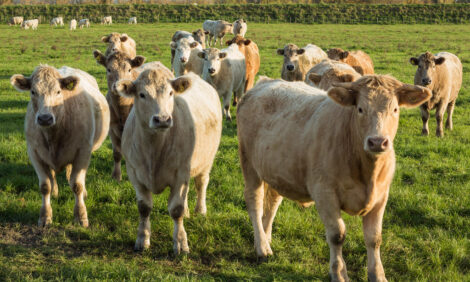



Montana Hopes for Beef Deal with Chinese Retail Giant Despite Trump's Trade
US - Montana officials are hoping that a blockbuster deal with Chinese retail giant JD.com to export local beef will be possible despite the US Government's escalating trade war with China."We are still talking," Jay Bodner, executive vice-president of the Montana Stockgrowers Association (MSA), said.
In an exclusive interview with Xinhua on Tuesday, Mr Bodner said the win-win deal inked last November in Beijing is not dead in the water, despite a 25-per cent tariff on $34 billion of imports from China imposed by the Trump administration last Friday.
Beijing's expected response - an additional 25-per cent import tax on top of an existing 12-per cent hike - was hard for Montana to digest, especially in light of the pending JD.com deal.
"There is a pretty high level of concern," Mr Bodner, a rancher from eastern Montana who has been with the MSA for 16 years, said.
Comparing JD.com to America's Amazon.com, he said the Chinese internet giant's commitment to spend up to $100 million to build Montana's largest meat processing facility was still on the table.
More significantly, JD.com's pledge to buy $200 million worth of Montana beef in the next few years has not been canceled yet.
Mr Bodner and the MSA's 2,500 members are praying that another round of proposed US tariffs announced Tuesday by Trump administration - 10 per cent tariffs on an additional $200 billion on Chinese goods exported to the US - will not kill the biggest beef deal in Montana's history.
Since Washington ignited the trade dispute early this year, Montana's local ranchers and residents have been expressing their concerns about Washington's trade policy.
An editorial published by Bozeman Daily Chronicle, an influential local daily, titled "Trade war with China bad for Montana", warned that steep tariffs imposed by Trump administration on China's products could inflict collateral damage on a wide range of industries, including cattle production in Montana.
"Free trade - without the imposition of onerous tariffs - is not a partisan issue. Democrats and Republicans alike have touted its benefits to national economies. And historically, trade wars ignited by tariffs have been blamed for economic downturns, including the Great Depression," the editorial reads.
"(Ranchers want to make sure) we can go through this dispute, we can conduct business as normal, and we get back on track to build up (a) new export market," Mr Bodner said.
JD.com's offer to help build a Montana slaughterhouse also represents a new, huge potential profit center for Montana's cattle industry that will eliminate the current costs to ship cattle to processing plans in Colorado and Nebraska.
"Our goal (is) a plant here in Montana, which would reduce transportation costs, allow more value here, and provide a cheaper product if we can do that all in Montana," Mr Bodner said.
But Washington's on-again, off-again, on-again trade policy, and the threats of more tariffs on Chinese products have rattled many of Montana's farmers.
"If (the trade war) ends in one or two months from now, we're back in business," Mr Bodner said, voicing the hope of his constituents. A trade war lasting for more months could "create more challenge" to the deal.
"It does not mean that the agreement (with JD.com) would never occur, maybe we would scale the agreement back or you might have to make (some) adjustment into it," he said.
According to the US Department of Agriculture, China's beef imports have expanded from just $275 million in 2012 to $2.5 billion in 2017. But only a trickle comes from the United States.
"Last year we only sold about $31 million of product into China for US beef," Mr Bodner said. "By comparison, US beef exports to Japan equaled $2 billion."
Beef producers around the United States were ecstatic in April 2017 when China agreed to allow American beef in the Chinese market after a 14-year ban.
"We generated about $30 million ... in that short amount of time, so we're looking at an opportunity to try to regain our market share," Mr Bodner said.
TheCattleSite News Desk


